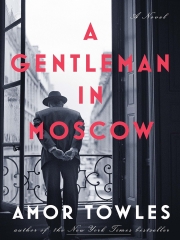A Gentleman in Moscow by Amor Towles
A whimsical, historical fiction version of The Suite Life of Zach and Cody. Somehow, the plot centers around the main character’s expertise in seating groups of patrons at a restaurant, against a backdrop of Soviet communism over the years.
1) “For eventually, we come to hold our dearest possessions more closely than we hold our friends.”
This stood out as an odd aphorism, and now that I’ve finished the book, it perhaps symbolizes how the main character evolved through the years.
2) “In the old and well-established code of dueling, it is understood that the number of paces the offender and the offended take before shooting should be in inverse proportion to the magnitude of the insult.”
What is the modern day equivalent of the ridiculous concept of dueling? MMA or Yugioh?
3) “‘Does a banquet really need an asparagus server?’ ‘Does an orchestra need a bassoon?'”
In fact, I can’t even remember if we had a bassoon in marching band.
4) “‘It is a sad but unavoidable fact of life that as we age our social circles grow smaller. Whether from increased habit or diminished vigor, we suddenly find ourselves in the company of just a few familiar faces. So I view it as an incredible stroke of good fortune at this stage of my life to have found such a fine new friend.'” – The Count
Diminished vigor. Diminishing marginal value.
5) “On the left was a Scylla of lower-priced dishes that could suggest a penny-pinching lack of flair; and on the right was a Charybdis of delicacies that could empty one’s pockets while painting one pretentious.”
The second item under Entrees is usually my go-to.
6) “A complaint was filed with comrade Teodorov, the Commissar of Food, claiming that the existence of our wine list runs counter to the ideals of the Revolution. That it is a monument to the privilege of the nobility, the effeteness of the intelligentsia, and the predatory pricing of speculators.”
And so the solution was to remove labels from a hundred thousand bottles. I guess a true wine connoisseur could tell what wine it is just from the color right?
7) “Not three weeks before – with the temperature hovering around 45 degree Fahrenheit – Theatre Square had been empty and gray.”
I was surprised to see Fahrenheit used several times in the book, so I looked it up. The interwebs say that USSR used Celsius. Hmm.
8) “Like his counterpart on the chessboard, the Bishop of the Metropol never moved along the rank or file.”
I liked the late surge of the unexpected villain – the Bishop.
9) “That is, if a man woke no later than six, engaged in a light repast, and then applied himself without interruption, by the hour of noon he should have accomplished a full day’s labor.”
The twice-tolling clock went off at noon and midnight. If you haven’t finished your work by the former and haven’t gone to bed by the latter, you’ve done something wrong.
10) “For the cinema, the Yanks had apparently discovered how to placate the entire working class at the cost of a nickel a week.”
Sometimes it feels like we as a species spend too much time producing and consuming entertainment, but maybe it is a net positive. It’s not necessarily a good thing when people have too much time. What would I do if people stopped writing books?
I really liked the book as a lighthearted walkthrough of Soviet history – some of its darker parts but also the masterpieces produced by people like Tolstoy and Tchaikovsky. I was surprised to realize how I had never mentally processed these greats as Russian. I also learned that Pushkin was a famous Russian poet, not just a hall-in-the-wall in SF that serves pretty good pelmenis. I wouldn’t say this book was particularly memorable or a must-read, but it’s one of the few books that really makes me appreciate culture.
